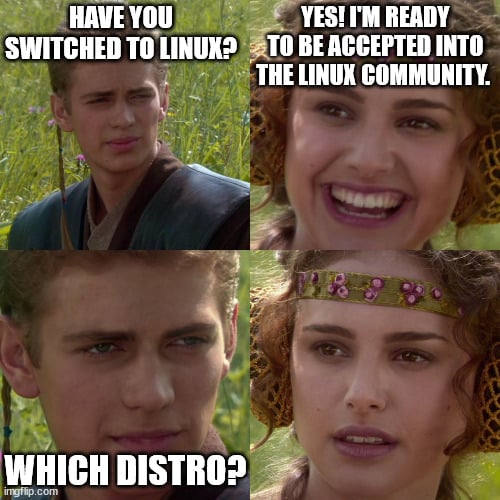this post was submitted on 14 Sep 2024
1398 points (96.8% liked)
linuxmemes
21863 readers
1091 users here now
Hint: :q!
Sister communities:
Community rules (click to expand)
1. Follow the site-wide rules
- Instance-wide TOS: https://legal.lemmy.world/tos/
- Lemmy code of conduct: https://join-lemmy.org/docs/code_of_conduct.html
2. Be civil
- Understand the difference between a joke and an insult.
- Do not harrass or attack users for any reason. This includes using blanket terms, like "every user of thing".
- Don't get baited into back-and-forth insults. We are not animals.
- Leave remarks of "peasantry" to the PCMR community. If you dislike an OS/service/application, attack the thing you dislike, not the individuals who use it. Some people may not have a choice.
- Bigotry will not be tolerated.
- These rules are somewhat loosened when the subject is a public figure. Still, do not attack their person or incite harrassment.
3. Post Linux-related content
- Including Unix and BSD.
- Non-Linux content is acceptable as long as it makes a reference to Linux. For example, the poorly made mockery of
sudoin Windows. - No porn. Even if you watch it on a Linux machine.
4. No recent reposts
- Everybody uses Arch btw, can't quit Vim, <loves/tolerates/hates> systemd, and wants to interject for a moment. You can stop now.
Please report posts and comments that break these rules!
Important: never execute code or follow advice that you don't understand or can't verify, especially here. The word of the day is credibility. This is a meme community -- even the most helpful comments might just be shitposts that can damage your system. Be aware, be smart, don't remove France.
founded 2 years ago
MODERATORS
you are viewing a single comment's thread
view the rest of the comments
view the rest of the comments

I'm not sure I understand that part. Is Canonical implementing the patches instead of the open source project/package developers? I'm confused.
Exactly. In Debian, the community implements security patches. In Ubuntu, Canonical implements security patches for a part of the repo (main), the community implements them for the remainder (universe). This has been the standard since Ubuntu's inception. With Ubuntu Pro, Canonical implements security patches for the whole repo (main and universe).
So they're actively involved in the development of open source projects then?
Not necessarily. For all of these cases, Debian, Ubuntu, Pro, the community and Canonical are package maintainers. Implementing patches means means one of: grabbing a patch from upstream and applying it to a package (least work, no upstream contribution); deriving a patch for the package from the latest upstream source (more work, no upstream contribution); creating a fix that doesn't exist upstream and applying it to the package (most work, possible upstream contribution). I don't know what their internal process is for this last case but I imagine they publish fixes. I've definitely seen Canonical upstreaming bug fixes in GNOME, because that's where I have been paying attention to at some point in time. If you consider submitting such patches upstream as actively involved in project development, then they are actively involved. I probably wouldn't consider that active involvement just like I don't consider myself actively involved when I submit a bug fix to some project.
Ah ok I see. Thanks for the clarification.